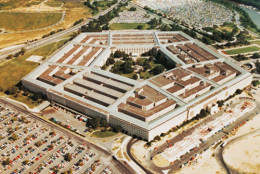Defense
-
Defense Secretary Ash Carter rolled out the first tranche in a series of reforms to DoD’s personnel systems. He said the military needs to adapt to a competitive recruiting landscape. Otherwise it could have trouble attracting the level of talent it needs. Federal News Radio’s Jared Serbu shares more on what these changes will bring to DoD's Force of the Future on Federal Drive with Tom Temin.
November 19, 2015 -
The Navy has to make some sink-or-swim decisions if it wants to remain intact. It must either maintain its fleet size and global presence and risk breaking the force or shrink to what it can afford. That's one finding of a comprehensive study by the Center for Strategic and Budgetary Assessments. Former Navy Officer Bryan Clark, a senior fellow at the Center, joined Federal Drive with Tom Temin to talk about how these decisions could affect the force.
November 19, 2015 -
The Department of Homeland Security has created a timetable to bolster the cybersecurity of civilian government systems, says DHS Secretary Jeh Johnson.
November 19, 2015 -
The Defense Department has no inventory on cyber access points in its buildings and is under-funding building maintenance, leaving military installations open to cyber attacks.
November 18, 2015 -
The Office of Management and Budget, the Homeland Security Department and the Office of Personnel Management decided not to testify during a classified briefing before the House Armed Services Committee when they found out the meeting would be on the record and transcribed.
November 17, 2015 -
The Pentagon has spent more than half a century refining the ways it buys from small business. In recent years, the Defense Department has met its statutory goal of awarding 23 percent of its contracting dollars to small and disadvantaged concerns. But that emphasis has come at a cost and not necessarily in dollars. Bill Lucyshyn is former Research Director at DARPA and now director at the Center for Public Policy and Private Enterprise at the University of Maryland's School of Public Policy. He joins Federal Drive with Tom Temin with more on a just-completed study of the Pentagon and small business.
November 17, 2015 -
The Defense Department is asking contractors to invest more of their revenues on research and development. Right now the industry average hovers at around 4 percent. Now DoD officials are calling on industry to shift its focus towards R & D and make it a higher priority. Federal News Radio's Scott Maucione tells Federal Drive with Tom Temin more. Read Scott's related story.
November 17, 2015 -
The Pentagon didn’t get everything it wanted out of the two-year spending deal the White House and lawmakers reached a couple weeks back. But for now, Defense budget officials are pretty pleased that they at least know what they’ll be allowed to spend for the next two years. Federal News Radio’s Jared Serbu has more.
November 16, 2015 -
Despite lower funding levels, Defense leaders count their blessings with two years of budget certainty.
November 16, 2015 -
The Marine Corps' information warfare chief will look into information operations and offensive weapons.
November 13, 2015 -
Over the next few months, sailors throughout the Navy’s fleet can expect to see new consequences when they violate the service’s cybersecurity policies. Troy Johnson is the director of the newly established Navy Cybersecurity division. He tells Federal News Radio’s Jared Serbu accountability measures are one element of what the Navy’s doing to drive home the fact that cybersecurity is everyone’s responsibility.
November 13, 2015 -
Warfare is constantly evolving. From cavalry horses to B-2's, the military competes in a cycle of innovations, countermeasures, and counter-counter-measures to get the leg-up on their enemies. But what happens when the battlefield shifts to cyberspace and changes the whole game? Joining the Federal Drive with Tom Temin via Skype to talk about some of the factors that could shape the future of warfare is Paul Scharre, a senior fellow at the Center for a New American Security.
November 13, 2015 -
The Defense Logistics Agency is trying to expand the way it uses performance-based logistics to better the products used by service members.
November 12, 2015 -
The Defense Department could be saving money and increasing efficiency with the Internet of Things, it just needs to broaden some of its ideas, states a new report.
November 12, 2015 -
With one year before the next presidential election, it's a safe bet the next administration will face challenges dealing with military veterans and with the still-troubled Veterans Affairs Department. Now the Center for a New American Security has come up with a comprehensive blueprint for the military and veterans community. Report co-author Kate Kidder shared some of the highlights with Federal Drive with Tom Temin.
November 12, 2015












